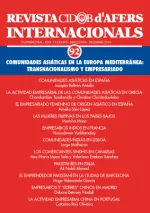Pakistanis in Italy: The disenchantments of “living transnationally”

This article begins with a constructive critique of theories on immigration and highlights the problems implicit in the suppositions of the social network/capital theory and in research on ethnic economies and “transnationalism”. From these theories, the author adopts the postulates that he considers to be most use­ful for applying to the analysis of the Pakistani diaspora in Italy, demystifying the old theories and calling for greater focus on the economic policy of the networks of emigrants that actually exist. He believes that diasporas act as organisms that are linked in space and time, and which progressively mutate. He goes on to observe how the relatively weak links that today’s emigrants maintain with their country of origin contrast with the undoubtedly stronger links that previous generations of Pakistani emigrants maintained in the United Kingdom; thus he suggests that we should break the reductionist chain of association that automati­cally attributes greater levels of transnationalism to the new emigration. In this respect, Nobil Ahmad notes that political and economic factors are sometimes more important than technology when it comes to shaping the intensity of the connections sustained between the issuing and welcoming societies in the migration process. Pakistanis in Italy have spent most of their energy working or standing up for their political rights in Europe rather than travelling or sending money home. Likewise, he notes that it is not always true that social networks necessarily carry out the function of mediation of emigration and reducing its costs; on the contrary, in the Mediterranean, the prominence of agenti in emigration networks suggests that we should be sensitive to the importance of mercantilised networks and to the commercial transactions between emigrants and autochthonous citizens. Finally, he calls attention to the individual experience of immigrants who have thrived businesswise, and whose experiences are determined by power relations, as well as by their position in the network or by the conditions surrounding their arrival in Italy, possibly from another European country and, perhaps, after becoming heavily indebted in order to pay for their journey. Following the waves of regularisations in Italy, most Pakistanis living there are facing a difficult environment.
Key words: Italy, Pakistanis, diaspora, ethnic entrepreneurs, immigration, transnationalism, networks
The full text articles of this issue are available only in Spanish language